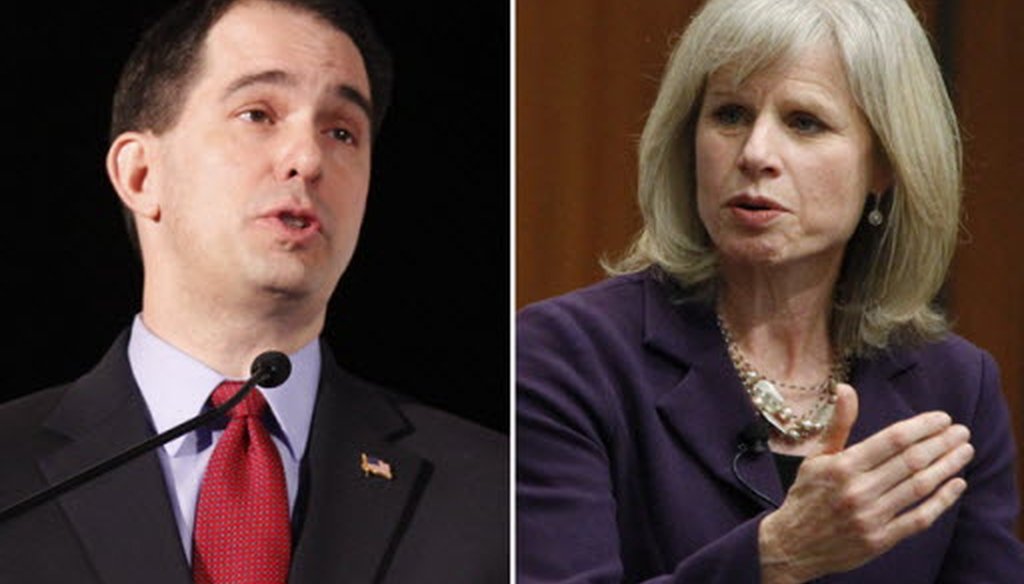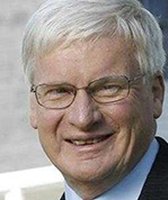Get PolitiFact in your inbox.

With the governor's race a dead heat in the latest Marquette poll, Gov. Scott Walker and Mary Burke take to the debate stage again on Oct. 17, 2014.
With Nov. 4 fast approaching, it’s possible one of the candidates for governor will open a fresh line of attack at the second and final debate Friday night.
More likely: Republican Gov. Scott Walker and Democratic challenger Mary Burke will turn to their familiar focus -- and different viewpoints -- on issues such as jobs, the state budget, education and health care.
Here is PolitiFact Wisconsin’s guide to the debate.
The debate, sponsored by the Wisconsin Broadcasters Association, airs at 7 p.m. Oct. 17, 2014 on numerous TV stations. But we recommend you watch on JSOnline, which will include an embedded stream of our factchecking tweets.
State’s finances
Deficit or surplus in the state budget? The candidates disagree, highlighting different points in time.
The bottom line, as the Journal Sentinel reported in September: The state closed a roughly $3 billion shortfall in Walker's first budget, is now a little out of balance in his second budget — the current one — and is expected to face a shortfall ($1.8 billion) heading into the next budget that is about half the size of the initial one, according to the latest available projections.
That projected shortfall is sometimes referred to as the structural deficit, which is basically the gap between projected revenues and increased costs for current budget items.
PolitiFact Wisconsin highlighted those figures in fact checks on claims by state Senators Alberta Darling and Chris Larson.
Our advice: Listen closely to whether the candidates are applying the right number to the right budget period.
Taxes
Walker has signed multiple tax-cut measures.
Burke correctly points out that Walker cut income taxes for wealthier residents, and separately raised income taxes for some people on the lower end of the scale by reducing tax credits, we noted in a September item.
But Walker is right when he says his income tax cuts applied across the board.
The tax rate on income up to $14,540 has fallen from 4.6 percent to 4 percent, for example. At the top end, income above $320,250 was taxed at 7.75 percent but now is taxed at 7.65 percent. Rates fell at all levels in between as well.
Another tax -- the property tax -- has come in for extra scrutiny under Walker, who made it harder for school districts and municipalities to raise local tax levies.
Not every property owner’s bills will be lower in 2014 than in 2010, but Walker correctly points out that property taxes on a hypothetical "typical" home will have dropped in that time, we reported in a January item.
Education
Under Walker, public schools saw less funding while state support of private schools was expanded as more districts were included in the voucher program.
Cuts Walker made in his first state budget were the largest per student made by any governor in America, based on two measures. But more recent figures indicate Wisconsin’s school spending cuts are no longer the largest, at least for a more recent period, we noted in August.
Walker counters that his Act 10 law freed up new funds for school districts by requiring most public employees contribute to pensions and by giving administrators more power over health care costs through the end to collective bargaining over benefits.
Act 10 has saved public employers -- state and local governments, and schools -- more than $3 billion, mostly by shifting some costs to their workforce, we found in August 2014.
Jobs
You’ll hear a blizzard of conflicting claims on private-sector job creation.
Walker’s top campaign promise in 2010 was that the state would create 250,000 private sector jobs by the end of his term. Based on the numbers so far, state employers won’t add even half of that amount.
Walker argues that he deserves credit for setting an ambitious goal, and takes credit for employers adding about 100,000 jobs during his time in office. Burke says Walker should be held accountable for failing to deliver on the jobs promise.
The state ranked 33rd nationally in private-sector job growth from March 2013 to March 2014, the latest data from the quarterly jobs numbers reported by federal officials.
Walker emphasizes more-recent timeframes to underscore a bit of improvement of late.
Burke tends to take the longer view.
The state was last in the Midwest for job creation from March 2011 to March 2014, using the latest quarterly data, considered the "gold standard" because it comes from data gathered from nearly all state employers. The major weakness of that comparison is that it excludes the first three months of Walker’s term, as we noted in an October item.
And it ignores that in the 12 months from April 2013 to April 2014, the state was not "dead last." Wisconsin ranked No. 8 of 10.
Less-reliable but more timely data (running through August 2014) shows that in just the last year, Wisconsin was 4th out of 10 states in the region, we reported this month.
If you hear candidates talking about the raw number of jobs we added compared to other states, be wary of their conclusions.
The raw number of jobs added is a poor way to compare performance between states because populations differ greatly. You can’t meaningfully compare 1,000 jobs added in Wisconsin where there are about 2.4 million employees, to 1,000 jobs added in North Dakota where there are about 340,000 private sector workers.
A better way of comparing is the percentage change between states. For instance, North Dakota employment increased about 8.2 percent in 2012, while Wisconsin was up 1.5 percent.
Mining
The proposed Gogebic Taconite iron ore mine in far northern Wisconsin has received considerable discussion, in part because of the revelation that the mining company contributed $700,000 to the conservative Wisconsin Club for Growth. The group ran ads supporting Walker in the 2012 recall election.
Walker said he was unaware of the contribution by Gogebic. Burke says the contribution feels like "pay to play" because Walker and Republican lawmakers later approved legislation sought by the mining company.
Approval of the law that paved the way for the mine hasn’t lead to a hiring boom for mine-related work in Northern Wisconsin -- at least not yet, we reported in a recent item.
About 10 operating engineers have been involved in preliminary work on the mine. But the project is on hold until preliminary environmental work is finished next year.
Gogebic has said that construction of the mine and its related processing plants and infrastructure would create 3,000 jobs. Once operating, the mine would employ about 700 people, with a projected 2,834 total jobs created from related businesses.
Our Sources
PolitiFact Wisconsin archives











































